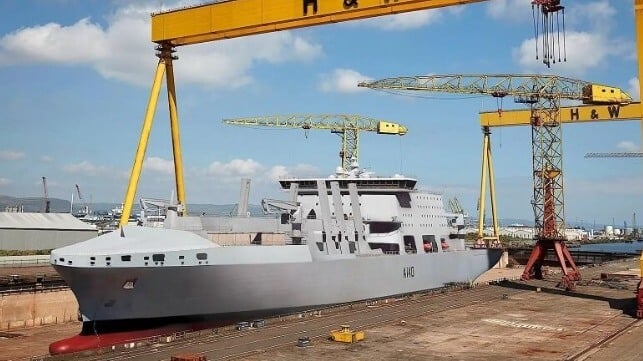UK Picks Spanish Consortium to Build Next Royal Navy Fleet Auxiliary

The government of UK Prime Minister Rishi Sunak has selected a joint British / Spanish consortium to build the next generation of Royal Navy dry stores auxiliary ships, with most structural elements to be built in the UK. The total price comes to about $1.9 billion for three hulls.
The decision sets aside an all-British bid from Babcock and BAE Systems. Industry insiders suggested that the Babcock/BAE price would likely be in excess of the government's budget, though the exact cost proposed in the losing bid has not been disclosed.
The government's decision to select the budget-compliant Spanish/UK proposal has drawn the ire of British unions and the opposition Labour party.
"At a time when the economy is struggling, it is short-sighted in the extreme to go with a bid that takes most of the high-value work and intellectual property overseas," said Mike Clancy, the general secretary of the union Prospect.
The contract has a long and controversial history. In May 2018, the UK Ministry of Defence posted a contract tender for up to three "Fleet Solid Support" ships to resupply the Royal Navy's warships at sea. The MoD invited overseas shipbuilders to participate in the bidding, drawing criticism from maritime unions and domestic shipbuilding advocates.
The initial tender for the FSS project attracted interest from multiple defense shipbuilders around the world, including Navantia, Fincantieri, Japan Marine United and DSME.
In November 2019, after an independent review poured cold water on the idea of foreign participation in the contract, the MoD suspended the bidding process for the FSS. However, when it reopened talks with contractors in August 2020, the MoD once again revived the option for "international suppliers" to participate, drawing condemnation from domestic shipbuilders, unions and the opposition Labour Party.
The winning bid for the contract splits the difference between foreign and domestic options. The majority of the blocks and modules will be built by Harland & Wolff's yards in Northern Ireland and England, but other elements of construction (and about 40 percent of contract value) will be completed at Navantia's shipyard in Cadiz, Spain. Final assembly for all three ships will be completed at Harland & Wolff's Belfast yard.
To support the UK element of the project, the government will invest about $90 million in shipyard infrastructure.

that matters most
Get the latest maritime news delivered to your inbox daily.
The UK has allowed foreign yards to bid on and win defense shipbuilding contracts before. In 2012, the state-subsidized South Korean shipbuilder DSME won the contract for the last UK fleet auxiliary order, the Tide-class oiler. At the time, the MoD noted that DSME was the last contractor standing in the bidding process, and it concluded that the foreign offer represented "best value for money for taxpayers." DSME delivered the class of oilers for a total combined cost of $540 million for four ships.
Critics of these contracts argue that hiring foreign yards will undermine UK national security by weakening the domestic industrial base. “This action constitutes an unprecedented step by a G7 country to offshore warship production – something no G7 country would even consider," said former defense minister Kevan Jones in a statement. "This decision is a betrayal of UK shipyards and the individuals who have spent their lives building up skills to execute contracts like the Fleet Solid Support ship."
